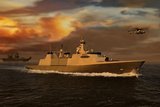Firing trials of Sea Ceptor complete
The Royal Navy has successfully completed First of Class firing trials of the Sea Ceptor air defence system on board HMS Argyll, MBDA announced on 20 December.
These final qualification firings saw Sea Ceptor tested against complex scenarios, including multiple simultaneous threats.
Following the completion of Sea Ceptor’s development testing on HMS Argyll, the weapon system is now being rolled out to the Royal Navy’s other Type 23 frigates, where it will replace the Sea Wolf weapon system. The first of a series of installation test firings has been successfully completed on HMS Westminster. Each Sea Ceptor platform will similarly complete an installation test firing in due course as they prepare to re-join frontline service after their refits.
The Sea Ceptor system, which uses MBDA’s Common Anti-air Modular Missile (CAMM), features a powerful rocket motor that provides double the range of Sea Wolf and an active radar-seeker that allows the missile to engage targets without the need for complex and costly target illuminators.
Nick Neale, manager for Sea Ceptor programme at MBDA, said: ‘The performance and capabilities of Sea Ceptor have been fully demonstrated in these trials by the Royal Navy. Recognising the complexity of the new system, the consistent level of success achieved is significant and testament to the quality of MBDA’s verification and validation process.’
More from Naval Warfare
-
![Spain’s F100 upgrade mirrors Aegis modernisation paths in allied navies]()
Spain’s F100 upgrade mirrors Aegis modernisation paths in allied navies
The Spanish Navy’s Alvaro de Bazan-class of air defence frigates will receive the latest Aegis Weapon System technology among other modernisations to extend the service life to 2045.
-
![UK’s Fleet Solid Support ship programme deemed on track despite steel supply concerns]()
UK’s Fleet Solid Support ship programme deemed on track despite steel supply concerns
Shipbuilders are saying the programme is going ahead on time as the government estimates 7.7 million tonnes of steel are needed for 2026 infrastructure projects.
-
![US Coast Guard Cutter Polar Star’s 50-year service highlights capability gaps in Antarctica]()
US Coast Guard Cutter Polar Star’s 50-year service highlights capability gaps in Antarctica
Delays in the construction of the Polar Security Cutter – the future substitute for the Polar Star – are likely to prolong the ageing icebreaker’s service time even more, putting the USCG in a risky position.
-
![As Indonesia doubles up its order, who else is looking at the Arrowhead 140 frigate design?]()
As Indonesia doubles up its order, who else is looking at the Arrowhead 140 frigate design?
The adaptable design of Babcock’s Arrowhead 140 frigate, already selected by the UK Royal Navy and Poland, has led to more orders from Indonesia while other countries continue to weigh it up.























